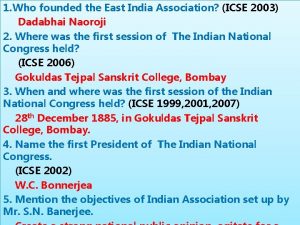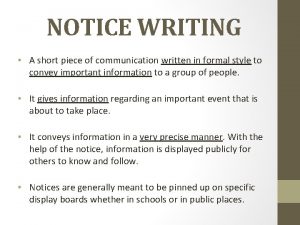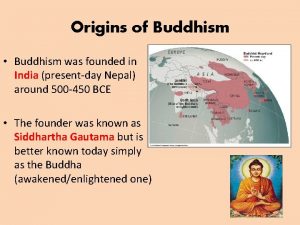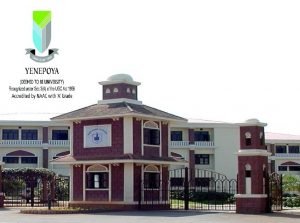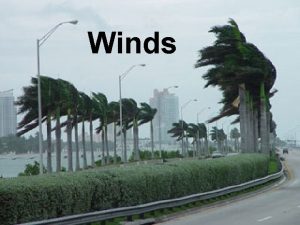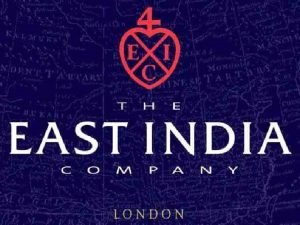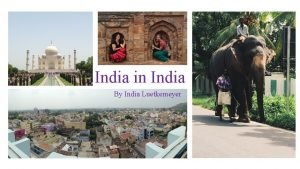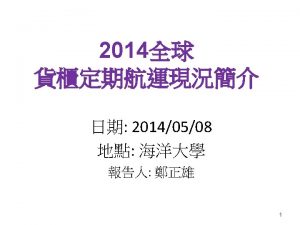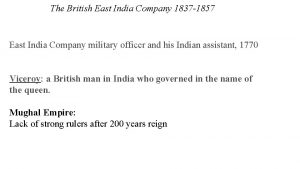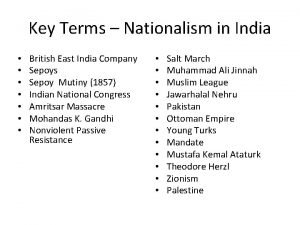1 Who founded the East India Association ICSE







- Slides: 7

1. Who founded the East India Association? (ICSE 2003) Dadabhai Naoroji 2. Where was the first session of The Indian National Congress held? (ICSE 2006) Gokuldas Tejpal Sanskrit College, Bombay 3. When and where was the first session of the Indian National Congress held? (ICSE 1999, 2001, 2007) 28 th December 1885, in Gokuldas Tejpal Sanskrit College, Bombay. 4. Name the first President of The Indian National Congress. (ICSE 2002) W. C. Bonnerjea 5. Mention the objectives of Indian Association set up by Mr. S. N. Banerjee.

6. Who was called The Grand Old Man of India? (ICSE 2001) Dadabhai Naoroji 7. Who was called The Father of National Movement in India? (ICSE 1999) Surendranath Banerjee 8. Mention the regional association that each nationalist was associated with : (i) Surendranath Banerjee (ii) Dadabhai Naoroji (ICSE 2010) (i) Indian Association in 1876 and Indian National Conference 1883 (ii) East India Association in 1866

9. Mention two Acts against which Surendranath Banerjee protested. (ICSE 2008) Indian Vernacular Press Act and Indian Arms Act in 1878 10. Name two forerunners of The Indian National Congress. (ICSE 2008) Indian Association in 1876 and East India Association in 1866. 11. Name the moderate leader who explained the economic drain theory during the colonial times. (ICSE 2004) Dadabhai Naoroji 12. Who exposed the economic exploitation of India through his book ‘Poverty and Unbritish Rule in India’? (ICSE 2013) Dadabhai Naoroji

13. Mention two contributions of Dadabhai Naoroji to the national movement. (ICSE 2006) Passed the resolution of Swadeshi and Boycott in the INC session in 1906. Wrote the book ‘Poverty and Un. British Rule In India’ explaining the drain theory of India’s wealth to Britain. 14. Name the Act of Lord Lytton ‘s regime which aimed at limiting the freedom of the Press. (ICSE 2003) The Vernacular Press Act 1878. 15. What were the methods used by the Moderates to fight against the British? Three P’s i. e. Petition, Prayer and Protest. 16. Mention two achievements of the Moderates. (ICSE 2011) (i) Promoted democratic rights, freedom, justice and (ii) Spread consciousness among the masses to fight for their rights.

17. Mention two reasons for the Moderates faith in the British sense of justice. (ICSE 2012) As the Moderates thought of getting the benefit of the introduction of modern means of transport and communication and western education. 18. Name the Moderate leader who also happened to the political guru or mentor of Gandhiji. Gopal Krishna Gokhale. 19. What was special about the Presidentship of Dadabhai Naoroji in 1906? He was made the consensus President to avoid the split with the Assertives. Secondly the historic resolution of Swadeshi, Swaraj and Boycott was passed.

20. In which years did the Moderate era exist? 1885 -1905 21. Name four Moderate leaders of the Indian National Congress. Gopal Krishna Gokhale, Dadabhai Naoroji, Surendranath Banerjee and W. C. Bonnerjea. 22. When and by whom was the Indian National Congress formed? (ICSE 2009) 28 th December 1885 by Mr. A. O. Hume a retired British ICS officer. 23. Mention any two objectives for the formation of the Indian National Congress in 1885. (ICSE 2005) (i) To make it possible for all the national workers of India to know each other. (ii) To make a list of common demands to be put up to the British.

24. Who was the political guru of Mahatma Gandhi? Gopal Krishna Gokhale. 25. When and by whom was the Servants of India Society founded? By Gopal Krishna Gokhale in 1905. 26. When and by whom was the Indian National Congress formed? (ICSE 2009) 28 th December 1885 by Mr. A. O. Hume a retired British ICS officer. 27. Why did Mahatma Gandhi accept Gokhale as his political guru? As Gokhale had gone to South Africa interacted and invited Gandhi to visit India, Gandhi was influenced by his work ethics and commitment and accepted Gokhale as his political guru or mentor. 28. Who was known as “India’s Unofficial Ambassador in England”?
